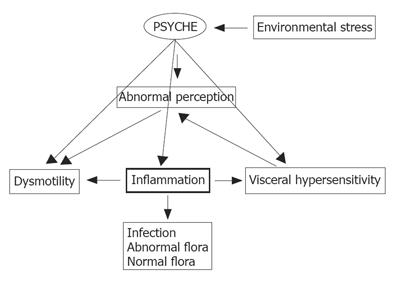©2006 Baishideng Publishing Group Co.
World J Gastroenterol. Jan 7, 2006; 12(1): 1-5
Published online Jan 7, 2006. doi: 10.3748/wjg.v12.i1.1
Published online Jan 7, 2006. doi: 10.3748/wjg.v12.i1.1
Figure 1 Interactions between the gut, the brain and the external and internal environments in IBS; the Iinflammation hypothesis (a personal view).
Bacterial or viral infection, a disturbed flora or an abnormal response to a normal flora leads to mucosal Iinflammation which in turn can disrupt motility and augment visceral sensation. Centrally, perception is abnormal, thereby, contributing to symptom development. Central output can in turn influence motor events in the periphery. While not central to causation, psychological factors, either spontaneously or in response to environmental stressors, can influence motor and sensory events and immune activity in the gut.
- Citation: Quigley EM. Changing face of irritable bowel syndrome. World J Gastroenterol 2006; 12(1): 1-5
- URL: https://www.wjgnet.com/1007-9327/full/v12/i1/1.htm
- DOI: https://dx.doi.org/10.3748/wjg.v12.i1.1













